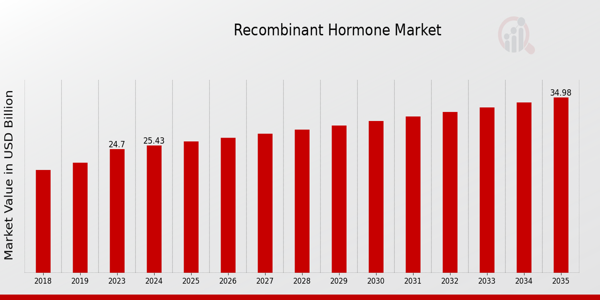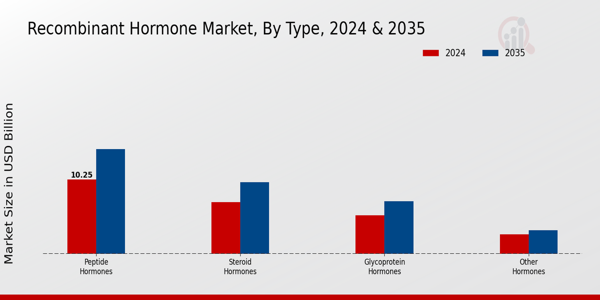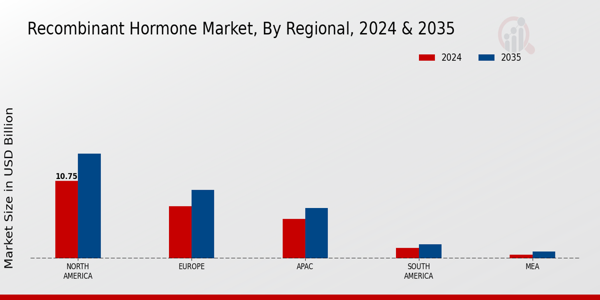Recombinant Hormone Market Overview
The Recombinant Hormone Market Size was estimated at 24.7 (USD Billion) in 2023. The Recombinant Hormone Market Industry is expected to grow from 25.43(USD Billion) in 2024 to 35.0 (USD Billion) by 2035. The Recombinant Hormone Market CAGR (growth rate) is expected to be around 2.94% during the forecast period (2025 - 2035).
Key Recombinant Hormone Market Trends Highlighted
The Recombinant Hormone Market is seeing a rapid expansion owing to specific factors. The worldwide adoption of recombinant hormones has surged due to the high incidence of hormonal and metabolic disorders across the globe. Moreover, innovation in the biotechnology industry has made it easier to manufacture these products, resulting in more available treatments. Also, increasing knowledge regarding personalized medicine has caused more patients and healthcare professionals to shift focus to specific hormonal therapies, which broadens the market scope. In addition, the elderly are a major segment that impacts the industry significantly since most of them suffer from hormonal imbalance conditions that need treatments. As the market evolves, various opportunities emerge for stakeholders. There is potential for innovation in drug formulations and delivery methods, making therapies more effective and patient-friendly. Expansion into emerging markets where healthcare infrastructure is improving can also provide substantial growth avenues. Collaborations between biotechnology firms and healthcare providers can enhance research and development efforts and lead to breakthroughs that address unmet medical needs. Companies that focus on creating affordable treatments may find a significant niche, especially in developing regions where cost remains a considerable barrier. Recent trends in the recombinant hormone segment indicate a shift toward biologics as the preferred treatment option. The integration of digital health solutions is becoming more prominent, supporting patient management and monitoring. Furthermore, there is a growing emphasis on sustainability in production processes, with many firms exploring eco-friendly methods. Regulatory frameworks are also evolving, aiming to streamline the approval process for new therapies, which may accelerate market entry for innovative products. Overall, the Recombinant Hormone Market is poised for continued growth supported by technological advancements and changing healthcare dynamics.

Source Primary Research, Secondary Research, MRFR Database and Analyst Review
Recombinant Hormone Market Drivers
Rising Prevalence of Hormonal Disorders
The increasing prevalence of hormonal disorders worldwide has emerged as a significant driver for the Recombinant Hormone Market Industry. A growing population, coupled with sedentary lifestyles and dietary changes, has led to an uptick in conditions such as obesity, diabetes, and thyroid disorders. Additionally, the aging population is particularly vulnerable to hormonal imbalances, increasing the demand for effective recombinant hormone therapies. Patients suffering from these conditions often require ongoing hormone replacement or supplementation therapies to manage their symptoms effectively. As the number of individuals diagnosed with these disorders rises, so does the demand for recombinant hormones, which are designed to mimic the effects of natural hormones in the body. This trend is expected to continue as healthcare providers increasingly recognize the importance of maintaining hormonal balance for overall health and well-being. Furthermore, advancements in biotechnology have enabled the production of these hormones with improved purity and safety profiles, which is likely to enhance their adoption further. Consequently, the growing prevalence of hormonal disorders is a strong driving force behind the expansion of the Recombinant Hormone Market Industry, propelling both research and development and market revenues.
Technological Advancements in Biotechnology
Technological advancements in biotechnology play a crucial role in propelling the growth of the Recombinant Hormone Market Industry. Innovations in genetic engineering, fermentation technologies, and purification processes have significantly improved the production efficiency and quality of recombinant hormones. These advancements not only enhance the safety and efficacy of hormone therapies but also reduce production costs, making treatments more affordable and accessible to patients. As biopharmaceutical companies continue to invest in cutting-edge research and development, the market is expected to benefit from a pipeline of new recombinant hormone products addressing various hormonal disorders, driving growth in the sector. The synergy between technology and healthcare is crucial for the future of the industry.
Growing Adoption of Personalized Medicine
The growing adoption of personalized medicine is reshaping the landscape of the Recombinant Hormone Market Industry. With a shift towards tailored treatment approaches, healthcare providers are increasingly focusing on individualized therapies based on the specific needs and genetic profiles of patients. Recombinant hormones play a critical role in personalized medicine, allowing healthcare professionals to prescribe targeted treatments that optimize hormone levels for improved patient outcomes. As more research underscores the efficacy and safety of personalized approaches, the demand for recombinant hormone therapies is expected to rise. This trend is reflected in the increasing investments in research that aim to enhance the understanding of hormonal functions and interactions within the body, further driving the market forward.
Recombinant Hormone Market Segment Insights
Recombinant Hormone Market Type Insights
The Recombinant Hormone Market is significantly categorized by Type, which includes Peptide Hormones, Steroid Hormones, Glycoprotein Hormones, and Other Hormones. In 2024, the market reached a value of 25.43 USD Billion, with each type contributing differently to this valuation. Peptide Hormones are the largest component of the market, valued at 10.25 USD Billion, showcasing their majority holding and substantial market influence due to their wide applications in diabetes management, growth disorders, and various therapeutic uses. Following closely, Steroid Hormones are estimated at 7.12 USD Billion in 2024, proving significant in hormone replacement therapies and the treatment of various medical conditions, with their growing demand driven by increasing awareness and advancements in biotechnology. Glycoprotein Hormones make up a notable portion of the market with a valuation of 5.34 USD Billion, being essential in reproductive health and fertility treatments. Other Hormones hold a value of 2.72 USD Billion as of 2024, representing niche markets with specific therapeutic applications but with comparatively lower market presence. The projected market growth from 2024 to 2035 reflects the evolving landscape of recombinant hormone therapies that are becoming increasingly interconnected with advancements in healthcare and biotechnology. The overall market growth is supported by various factors, including the rising prevalence of hormone-related disorders, the expansion of healthcare infrastructure, and increased funding for research and development. However, the market also faces challenges such as high production costs, regulatory hurdles, and competition from alternative treatment modalities. The Recombinant Hormone Market data illuminates the competitive dynamics within the market, emphasizing the necessity for innovation and strategic partnerships among stakeholders to capture growth opportunities and overcome existing challenges. The statistics on market segmentation depict a robust demand for Peptide Hormones, affirming their role as a driving force in the Recombinant Hormone Market industry, while other segments like Steroid and Glycoprotein Hormones continue to evolve with increasing relevance and application. The market's potential for expanding treatment options, particularly in the wake of new technological advancements and growing patient populations, supports a favorable outlook for all types of recombinant hormones, reinforcing their importance in modern medicine.

Source Primary Research, Secondary Research, MRFR Database and Analyst Review
Recombinant Hormone Market Application Insights
The Application segment of the Recombinant Hormone Market has demonstrated significant growth potential, particularly with a market valuation of 25.43 USD Billion in 2024. Key areas within this segment consist of Diabetes Treatment, Infertility Treatment, Growth Hormone Deficiency, and Thyroid Disorders. Diabetes Treatment, often considered a major factor driving market growth, addresses the increasing prevalence of diabetes ly. Infertility Treatment is gaining importance as rising awareness and patient options expand. Growth Hormone Deficiency remains prevalent among various age groups and plays a crucial role in hormone regulation, further solidifying its significance in this market. Thyroid Disorders also capture a considerable share, reflecting the rising incidence of thyroid-related conditions worldwide. The market's diversity is influenced by both increasing health awareness and advancements in technology that enhance the efficacy of recombinant hormones, catering to a broad spectrum of health needs and improving patient outcomes. The Recombinant Hormone Market revenue is projected to exhibit steady growth, driven by innovations and a rising rate of hormone-related health issues. With these factors in mind, a comprehensive understanding of the Recombinant Hormone Market data and segmentation underlines the substantial opportunities within each application.
Recombinant Hormone Market End-Use Insights
The Recombinant Hormone Market showcases a diverse End Use landscape, significantly contributing to the market's overall growth. The market, valued at 25.43 USD Billion in 2024, reflects the vital role played by pharmaceutical companies, which remain crucial in developing innovative therapies utilizing recombinant hormones. Research institutions are also pivotal, often driving advancements in hormone research, which fuel the demand for recombinant hormones in various applications. Healthcare providers leverage these hormones to enhance treatment options for patients, signifying their importance in therapeutic practices. With ongoing research and emerging applications, the market is positioned for steady growth, supported by increasing investments in healthcare technologies and pharmaceutical innovations. The Recombinant Hormone Market statistics highlight a strong focus on improving patient outcomes, while challenges like regulatory hurdles and high development costs persist. Nevertheless, opportunities abound for collaborations across the healthcare spectrum, leading to advancements in hormone therapies and enhancing the market dynamics. This comprehensive segmentation underscores the multifaceted nature of the Recombinant Hormone Market, which is poised for continuous evolution and expansion over the coming years.
Recombinant Hormone Market Mode of Administration Insights
The Recombinant Hormone Market, with an expected valuation of 25.43 USD Billion in 2024, showcases diverse opportunities, particularly in its Mode of Administration segment, which consists of Injectable, Oral, and Transdermal methods. Injectable formulations account for a significant share due to their effectiveness in delivering hormones directly into the bloodstream, ensuring rapid action, which is critical in therapeutic settings. Oral administration, offering convenience and ease of use, is gaining traction, especially among patients preferring non-invasive options, thus driving the demand for orally administered recombinant hormones. Meanwhile, Transdermal delivery is noteworthy as it provides continuous hormone release, minimizing fluctuations in hormone levels, which is beneficial for chronic conditions. With consistent advancements aimed at enhancing delivery methods, including innovations in formulation and patient adherence, market growth is further supported. The integration of these administration routes within the Recombinant Hormone Market reflects the industry's response to patient needs and evolving healthcare dynamics. The shifting preferences of consumers and advancements in drug delivery technologies will likely continue to impact market statistics positively, presenting both challenges and opportunities in the years to come.
Recombinant Hormone Market Regional Insights
The Recombinant Hormone Market is experiencing notable growth across its regional segmentation, with the market reaching a value of 25.43 USD Billion in 2024. North America holds a majority share, valued at 10.75 USD Billion in 2024 and expected to grow to 14.5 USD Billion by 2035, demonstrating its significant role in the Recombinant Hormone Market. Europe follows, with a valuation of 7.25 USD Billion in 2024, showcasing a strong market presence as well. The APAC region contributes substantially, valued at 5.5 USD Billion in 2024, driven by increasing healthcare investments.
Meanwhile, South America and MEA are smaller segments, valued at 1.5 USD Billion and 0.5 USD Billion in 2024, respectively, though they provide opportunities for growth as demand increases in these markets. This regional landscape reflects diverse growth drivers, including advancements in biotechnology, the increasing prevalence of hormonal disorders, and a growing aging population, while challenges like regulatory hurdles and high production costs persist. Overall, the Recombinant Hormone Market data indicates a healthy trajectory influenced by regional dynamics and varying growth factors.

Source Primary Research, Secondary Research, MRFR Database and Analyst Review
Recombinant Hormone Market Key Players and Competitive Insights
The Recombinant Hormone Market presents a dynamic landscape characterized by intense competition among key players striving to leverage advancements in biotechnology and pharmaceutical developments. Recombinant hormones are biologically engineered hormonal agents produced through recombinant DNA technology, and they serve vital therapeutic roles in the management of various health conditions such as diabetes, growth disorders, and hormonal deficiencies. The market is influenced by a combination of factors, including technological innovations, regulatory environments, and growing health awareness, resulting in a strategic focus on product development, marketing initiatives, and partnerships to enhance market share and service delivery. Companies in this space must navigate challenges related to pricing pressures, intellectual property rights, and the increasing prevalence of metabolic disorders, which necessitate a keen understanding of market demand and competitive positioning. Novo Nordisk stands out in the Recombinant Hormone Market due to its extensive product portfolio and a strong emphasis on research and development. As a leader in diabetic care, Novo Nordisk has established a robust presence with its recombinant insulin products, which are pivotal in managing blood glucose levels for millions of patients worldwide. Their commitment to innovation is exemplified by their advancements in insulin formulations and delivery devices, catering to the evolving needs of patients. Novo Nordisk's long-standing reputation, along with its strategic collaborations and investments in new technologies, enhances its competitive edge within the market. Additionally, the company's focus on sustainability and corporate social responsibility initiatives strengthens its brand loyalty and contributes to a positive public perception, further solidifying its position as a market leader. Amgen operates within the Recombinant Hormone Market with a strong focus on the development of biologics and innovative therapeutics. Renowned for its R&D capabilities, Amgen leverages cutting-edge technology to create recombinant hormones that address significant healthcare needs, such as erythropoietin, for anemia management. The company benefits from its well-structured market approach and extensive distribution channels that amplify its reach, particularly in North America and Europe. Amgen is committed to patient-centered solutions, which resonates strongly with healthcare providers and patients alike. Furthermore, Amgen's ongoing investments in clinical studies and partnerships with healthcare organizations are integral to enhancing the efficacy and accessibility of their recombinant hormone therapies, enabling the company to maintain competitiveness in a continuously evolving market landscape.
Key Companies in the Recombinant Hormone Market Include
- Teva Pharmaceutical Industries
Recombinant Hormone Market Industry Developments
Recent developments in the Recombinant Hormone Market have indicated significant growth and strategic shifts among key players, including Novo Nordisk, Amgen, and Pfizer. The continuous advancements in recombinant technology have fostered the development of innovative therapies that enhance patient outcomes, particularly in diabetes and growth disorders. Notably, Novo Nordisk has expanded its portfolio with new formulations that improve patient adherence and efficacy, while Amgen has focused on enhancing its production capabilities. Current affairs suggest a vigorous competitive landscape, with companies actively pursuing collaborations to bring cutting-edge hormonal therapies to market. Additionally, recent mergers have reshaped industry dynamics, notably with Johnson and Johnson acquiring potential assets in the recombinant space to bolster its product line. Furthermore, Teva Pharmaceutical Industries is reportedly enhancing its operational efficiencies to accommodate the rising demand for recombinant hormones. As market valuations grow, driven by these developments and the increasing prevalence of hormone-related conditions, companies like Roche and Eli Lilly are poised to capitalize on emerging opportunities, thus further intensifying their focus on research and development in the recombinant hormone sector.
Recombinant Hormone Market Segmentation Insights
Recombinant Hormone Market Type Outlook
Recombinant Hormone Market Application Outlook
- Growth Hormone Deficiency
Recombinant Hormone Market End-Use Outlook
Recombinant Hormone Market Mode of Administration Outlook
Recombinant Hormone Market Regional Outlook
| Attribute/Metric Source: |
Details |
| MARKET SIZE 2023 |
24.7(USD Billion) |
| MARKET SIZE 2024 |
25.43(USD Billion) |
| MARKET SIZE 2035 |
35.0(USD Billion) |
| COMPOUND ANNUAL GROWTH RATE (CAGR) |
2.94% (2025 - 2035) |
| REPORT COVERAGE |
Revenue Forecast, Competitive Landscape, Growth Factors, and Trends |
| BASE YEAR |
2024 |
| MARKET FORECAST PERIOD |
2025 - 2035 |
| HISTORICAL DATA |
2019 - 2024 |
| MARKET FORECAST UNITS |
USD Billion |
| KEY COMPANIES PROFILED |
Novo Nordisk, Amgen, Ferring Pharmaceuticals, Johnson and Johnson, Pfizer, Teva Pharmaceutical Industries, BristolMyers Squibb, Boehringer Ingelheim, Eli Lilly and Company, AbbVie, Genentech, Sanofi, Sandoz, Roche, Merck and Co. |
| SEGMENTS COVERED |
Type, Application, End Use, Mode of Administration, Regional |
| KEY MARKET OPPORTUNITIES |
Growing diabetes prevalence, Advancements in biotechnology, Increasing demand for fertility treatments, Rise in hormone replacement therapies, Expanding applications in sports medicine |
| KEY MARKET DYNAMICS |
Increasing diabetic population, Growing demand for fertility treatments, Advancements in biotechnology, Rising awareness about hormonal disorders, Expanding applications in sports medicine |
| COUNTRIES COVERED |
North America, Europe, APAC, South America, MEA |
Frequently Asked Questions (FAQ) :
The Recombinant Hormone Market was valued at 25.43 USD Billion in 2024.
By 2035, the Recombinant Hormone Market is projected to reach 35.0 USD Billion.
The anticipated CAGR for the Recombinant Hormone Market from 2025 to 2035 is 2.94%.
North America is expected to hold the largest market share, valued at 10.75 USD Billion in 2024.
The European market for recombinant hormones is expected to be valued at 9.5 USD Billion in 2035.
Major players in the market include Novo Nordisk, Amgen, and Pfizer among others.
The APAC region is expected to grow to 7.0 USD Billion by 2035.
The market size for steroid hormones is projected to be 9.89 USD Billion in 2035.
















